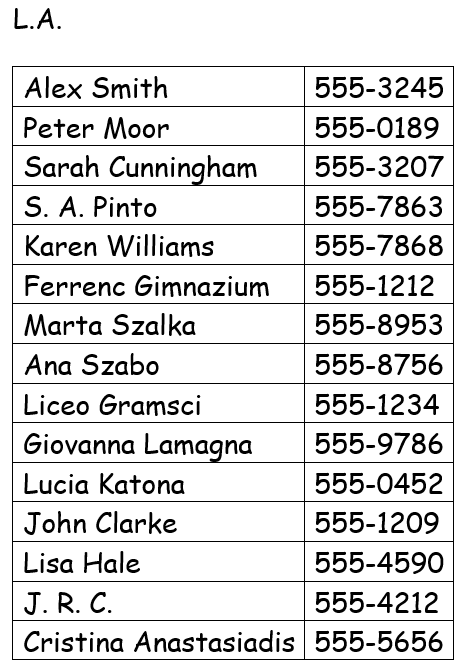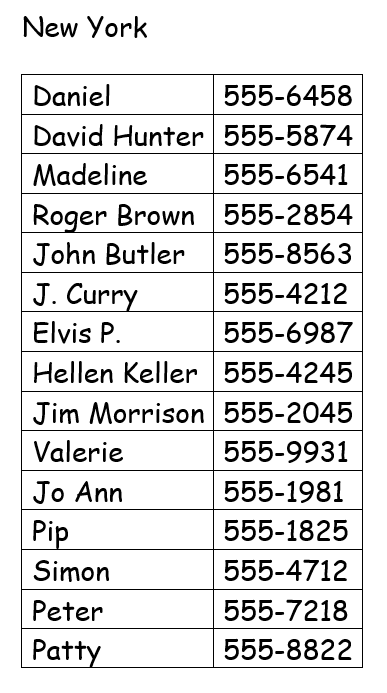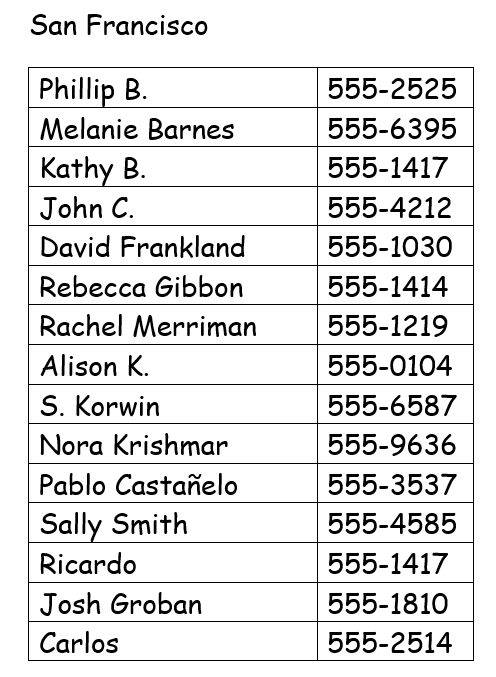11 The Reaper’s Helper
Based on the Law & Order Episode ‘The Reaper’s Helper’ – Season 1 – Episode 3
Note: This L&O-RPA involves discussions about sexual orientation and HVI.
| Level | Material needed |
| B1 and up | Copy of the cards |
General instructions:
Note: Check the Introduction to Law & Order Inspired RPAs for more instructions.
There are three important moments during an L&O-RPA:
- The captain discusses with the detectives their findings and assigns tasks (e.g. go to the building and talk to the superintendent).
- Students (as a whole class or in groups) follow the leads and interview people, reporting their findings to the captain.
- The whole class discusses the case and organizes the crime board, the timeline, reviewing the important information and thinking about the next steps.
The cards are organized in the order they appeared in the episode. However, the teacher may choose to alter this order.
Remember to have regular meetings with the “detectives” to review all the info they have collected and discuss possible courses of action.
For the interviews, invite students to play the role of the interviewees and allow some time for them to study their cards. The rest of the class will take the role of “detectives”. While they are studying their role, the groups (or the class) may work on what questions to ask. Each interview shouldn’t last longer than 10 minutes and different interviews can be conducted simultaneously, with representatives from each group reporting to the class and the captain their findings and adding relevant information to the crime board. See instructions about the crime board and timeline in the Introduction to Law & Order Inspired RPAs.
Remember that the teacher plays the role of the captain and from now on, the instructions will refer to “the captain”.
(Optional) Introduction
This Law and Order based RPA is set in 1990. The social context of that decade is important to understand the historical circumstances. The teacher may wish to discuss the issues revolving HIV infections in the United States in the early 90s.
Starting the Law & Order RPA
Note: Card 1 presents the crime scene. Distribute the card below to students. You may either place them in groups and have them study the crime scene, or you can discuss the case with the whole class. If you use groups, invite someone from each group to present their conclusions and ideas about the crime and what they would suggest doing next.
Time: 30 to 50 minutes
| Card 1 – Crime Scene
Manhattan, Monday evening, April 15, 1990: Detectives arrive at the scene – an apartment on the third floor of a building. Bobby Holland, 26 years old, is lying on the floor of his living room, shot in the back of the head apparently 2 days ago, most probably Saturday evening (the room stinks). There is no weapon in view. On the mantelpiece the detectives find Mr. Holland’s wallet filled with money. The apartment is trashed. There is no sign of forced entry. There is no fire escape. The body was found by the super.
|
| Card 2 – Bobby’s Super
This is the information you will provide: You went to Bobby´s apartment to collect the rent. You rang the bell several times, but nobody answered. You noticed the strange smell, so you decided to use your spare key to open the door. As soon as you saw him on the floor, you called 911. Bobby Holland rented the apartment about six months ago. He was a quiet tenant, a little shy, and never complained about anything. He paid his rent promptly and you´ve got no complaints from neighbors. He didn´t seem to have many friends. At least, he didn´t receive many visitors. You´ve seen Bobby´s father come to visit him a couple of times and a few friends. You don´t know any of them. You don´t think he had a girlfriend, but he hadn´t been in the city too long, so maybe he hadn´t had time to develop relationships. He was always very polite, and you can´t imagine why anyone would kill him. He looked quite normal and incapable of any violence despite his athletic build.
|
| Card 3 – Neighbor
This is the information you will provide: You live in the apartment below his. You always heard him play sad music, especially Gershwin. On Saturday night, at about 1:30 a.m., you were coming back from the Symphony Space, and you saw a guy running down the stairs. He went past you. But you’ve learned not to look. After all, it’s late and you live in New York. You don´t stare at people. You complain that if the building had a decent front door, this kind of thing wouldn’t happen.
|
| Card 4 – Forensics Expert
This is the information you will provide: Partial prints from about a dozen people were found around the apartment, which is about how much you would expect to be found in an apartment unless somebody had cleaned it. You have run the prints through the system, but there was no match. None of the people has a record and neither did Mr. Holland. There were no marks on the body – not a scratch, not a bruise – only the nice clean .38 entrance wound. The shot was fired from about 50 cm away. There are no powder burns on the body and no trace of powder on either hand. Mr. Holland did not shoot himself. He was killed on Saturday night, between 12 p.m. and 2 a.m.
|
| Card 5 – Captain
Tell detectives to visit Bobby’s parents and return his personal possessions (things they found on his body when he was brought to the morgue): a set of keys, a pen, and some loose change.
|
| Card 6 – Bobby Holland’s Parents
This is the information you will provide: You live in a city near New York. You´ve always lived there. Bobby was your only child. He was born a big child. He’s always been a big person, strong and athletic. He didn’t have a lot of friends, kept mostly to himself. After he moved to Manhattan 6 months ago, you had no idea who his friends were or whether he had any girlfriends. When he was in High School, he was very popular with the girls. He played on the football team and was the prom king. You don’t see him very often. In Manhattan, he worked as a department manager at a shipping company in Manhattan. His boss´ name was Massacio. The last time you spoke to him was about a week ago. Everything seemed fine. You did not notice anything different. Dad, you visited him regularly, about once or twice a month. You did not notice anything different. You don´t think he had a girlfriend or new friends. Every time you visited him, he was alone. He seemed happy with his job. Mom, you only went to the city once, when he moved. You helped clean up the apartment and put everything in order. You didn´t go again because you hate traveling to the city. You feel completely out of place in a big city. When you see the personal possessions, ask for the watch – an Omega stainless-steel watch. You gave it to him as a high school graduation present. It cost you a week’s pay. You also inform the police that you (the dad) gave him a gun when he moved to the city – a .38 pistol. It was licensed. You told him to keep it next to his bed. You can’t understand why he did not defend himself.
|
| Card 7 – Mr. Massacio, Bobby Holland’s Boss
This is the information you will provide: Bobby was a good man and a good employee. You hired him 6 months ago when he applied for the position. He had good references and you needed a manager immediately because the other manager had left the company for a better job with the government. (If the police ask you for his original application, tell them you don’t have it anymore). You don’t know very much about him because he kept to himself a lot, did not socialize, did not hang out after work, did not “cat” around. His closest friend at work was Angel Suarez. They sometimes had lunch together. Last week he worked as usual. He did not seem any different. The last time you saw him was Friday afternoon, when he left work. You don’t know if he went home or not. Last Saturday you stayed home. You are married and you’ve got three children. Some friends came over for a poker night.
|
| Card 8 – Angel Suarez, Bobby Holland’s Co-Worker
This is the information you will provide: You knew Bobby. He was a good man. You sometimes had lunch together, but Bobby did not talk very much about himself. You know he came to Manhattan about six months ago and his parents live in New Jersey. You have not met them. You don’t think he had a girlfriend. He did not like to go out a lot and didn’t have many friends. If you knew who did him in, you’d certainly tell the police. You are really angry about what happened. Bobby did not deserve it. On Saturday night you were in San Juan, visiting your parents. You came back on Sunday night. You still have the airplane tickets to prove it. The last time you saw Bobby was on Friday afternoon at work. He seemed normal. You think he went home. You know that on Saturday, Bobby was planning to have a drink with a friend, Lois Rivera. You don’t know where they were planning to go. He invited you to join them, but you had to travel. She sometimes has lunch at the same restaurant you usually go to, and you’ve known her for about two or three years now. Bobby met her at the restaurant as well and they became friends. She has a sandwich cart up on 42nd Street.
|
| Card 9 – Lois Rivera, Bobby Holland’s Friend
This is the information you will provide: You met Bobby about 6 months ago at the restaurant where you normally have lunch. He was introduced to you by an old friend of yours, Angel. Bobby had just arrived in the city and did not know anyone. He was Angel´s co-worker. You became good friends. You had a drink with Bobby at a bar across the street from where you have your sandwich cart on Saturday evening before you went to your sister’s house to baby-sit her children. You met him around 6:00 p.m. and you talked for about 2 hours. You arrived at your sister’s house at 9:00 p.m. You stayed there all night because your sister had to work overnight. She is a nurse at a hospital. You and Bobby talked a lot about nothing really important. You remember telling him that he should go back to college. He was really smart. He knew a lot about music and read a lot of books. You can’t think of anybody who would want to hurt him. He was not your boyfriend. Just a friend. After the drink, Bobby went to a bar downtown, Paradise Lost, a gay bar. Bobby was gay.
|
| Card 10 – Waiter at Paradise Lost
This is the information you will provide: Bobby comes in sometimes. He usually comes in alone. On Saturday evening he was accompanied by another guy you had never seen before, wearing a silk jacket. You did not hear anything, but, in your opinion, the silk jacket guy was a hustler (a male prostitute). He was a tall guy with dark hair in his thirties. If you see him again you believe you’ll recognize him. Bobby and the silk jacket guy left together around 11:00 p.m.
|
| Card 11 – Captain
Tell the detectives to talk again to Bobby’s parents about his sexual orientation. Maybe they have some information about his gay relationships.
|
| Card 12 – Bobby Holland’s Father (second interview)
This is the information you will provide: The detectives tell you that your son was gay. Your wife will never admit it, but you knew although you never discussed it with Bobby. He had everything going for him. He was handsome and very popular, and he was always surrounded by beautiful girls. You knew it the day he broke up with his high-school girlfriend. She was a beauty, gorgeous. After that, he did not have any other girlfriend. Then he moved to Manhattan. You would visit him in the city sometimes. You were very worried because you think the big city can be very dangerous for a young gay man. That’s why you gave him a gun. Bobby never talked about his men-friends, but he did mention one guy once. Someone named Angel. You don’t know the last name. You believe they were having an affair.
|
| Card 13 – Angel, Bobby Holland’s Co-Worker (second interview)
This is the information you will provide: You and Bobby had an affair, but Bobby broke it up about two months ago. You loved him. You would never do anything to hurt him. You did not mention anything because there is a lot of prejudice against gay men. If Mr. Massacio found out, he would probably fire both of you. Six or eight weeks ago, Bobby started seeing somebody new. You don’t know who he is. You don’t know very much about him except that they met at a gym and that he lives somewhere on the East Side. Jack something. You don’t know his last name.
|
| Card 14 – Captain
You’ve got some new information for the detectives:
Ask the detectives to study the address books and see if they can find anything interesting. (One phone number appears in all three address books: Jack or John(?) Curry. When they figure this out, ask the detectives to pick him up and bring him to the station for questioning. Teach them the “Miranda” statement: “You are under arrest for the murder of Bobby Holland. You have the right to remain silent. Anything you say can and will be used against you in a court of law. You have the right to an attorney. If you cannot afford an attorney, one will be provided for you at no cost.” Before questioning Jack Curry, tell the detectives that Bobby’s watch has been found in Jack’s apartment. It was engraved in the back: “To Bobby, with love. Dad”.
|
Address books:



| Card 16 – Jack Curry, Bobby Holland’s Friend
This is the information you will provide: You are a graphic designer and you have always lived in New York. You met Bobby when he was 16 at a summer camp and you became friends. You met the other two guys, Dwight and Jeffrey, in college. You went to UCLA and so did they. Bobby gave you the watch as a present. It was a thank-you present for helping him to shoot himself. Bobby wanted help to commit suicide. He had AIDS. He wanted it to look like a robbery so his mother wouldn’t know. You also confess to the cases in San Francisco and Los Angeles. They also had AIDS. In those cases, they didn’t want it to look like suicide because their families wouldn’t be able to collect the insurance. They pulled the triggers themselves, and you just wiped the guns clean and dumped them somewhere else. You tell them how horrible it is to die from AIDS, how you can’t breathe, how you waste away. You are also HIV positive. You describe how it happened in Bobby’s case: he didn’t want to die like that, and he didn’t want his mother to know. You tried to talk him out of it for several days. But he had already made up his mind. You held the gun, Bobby wrapped his hands around yours and said he wanted to die. You helped Bobby do what he wanted. You didn’t want to do it, but you weren’t considering yourself. It was a mercy killing. You hope that when you get really sick, you will find a friend to help you commit suicide.
|
| Card 11 – Bobby Holland’s Father (final interview)
This is the information you will provide: When you hear the police have picked up Jack Curry, go to the station and talk to the captain and detectives. Tell them that they should release Jack. You know that your son committed suicide because he asked you to help him. You told him that you could not do it. Your son was in great pain. He did not want to die that way. You were a coward. You did not have the courage to help your son.
|
Note to the teacher: The investigation has now come to an end. Your students have solved the case. You may stop here and congratulate them, or show the Law & Order episode and before the verdict is given by the jury, have the class discuss: guilty or not guilty?


Feedback/Errata